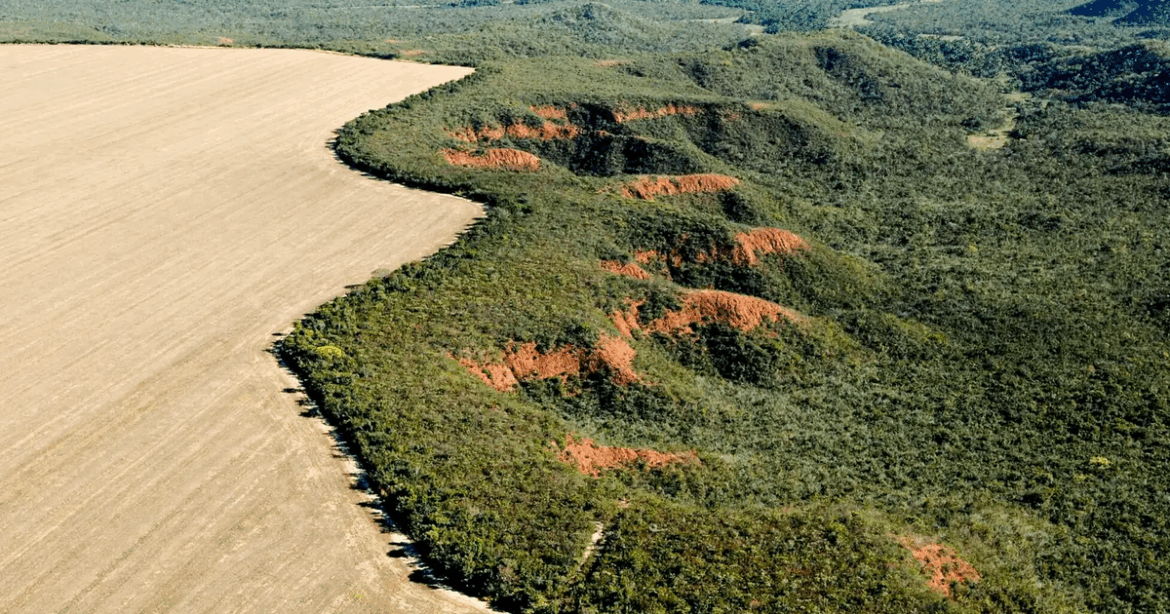“Secret Ingredient: A year of inaction”, 22 September 2025
Secret Ingredient revealed the links between chicken products sold by McDonald’s and Europe’s leading supermarkets – Carrefour, Intermarché, Edeka and Albert Heijn – and environmental and rights abuses in Brazil’s Bahia state. The investigation traced soy used by European feed manufacturers to agri-trading giants Cargill and Bunge. The two companies in turn sourced soy from producers clearing land in the Cerrado biome: the Horita Group, Mizote Group and Franciosi Agro.
A year after Secret Ingredient, recent satellite imagery reveals that Franciosi Agro and the Mizote Group have cleared an additional 986ha since May 2024. This includes 381ha deforested after the publication of our report – equivalent to over 533 football fields. Although they obtained the relevant deforestation permits, Earthsight’s analysis indicates this clearance includes areas of forest, which means soy grown on this land would be non-compliant with the upcoming EU Deforestation Regulation (EUDR). The European law bans products from areas deforested after 2020.
…The EUDR requires not only that commodities be deforestation-free, but also produced in compliance with producer-country laws, meaning soy from these illegally converted areas will be banned under the regulation. This is the case even if these lands do not meet the definition of forests used by the law….
Both Franciosi Agro and the Horita Group were certified by the Round Table on Responsible Soy (RTRS)…
RTRS launched an investigation into Franciosi Agro and the Horita Group in response to Secret Ingredient, suspending their certificates in the meantime. Almost one year on, RTRS has not yet concluded this investigation, reportedly due to lack of internal capacity.
…When contacted by Earthsight in August 2025, RTRS said it would consider action on this matter following the results of their investigation, suggesting changes to their standard could be on the table…
In the Cerrado, a vital carbon sink that supports irreplaceable biodiversity, destruction has continued…
The negative effects of soy expansion on the Cerrado extend beyond the clearance of native vegetation and are felt throughout the region’s waterways and by the people who live there…
Traditional communities face pesticide contamination and encroachment into their lands, often bringing violence and conflict. Estrondo – an agricultural mega-estate where Horita operates several properties – is one of Brazil’s most notorious cases of land grabbing…
The EU remains a major destination for soy leaving western Bahia…Approximately 95 per cent was exported by Bunge and Cargill – both of which were supplied by the agribusinesses exposed in Secret Ingredient.
In letters to Earthsight, Bunge and Cargill said they carry out regular checks on their suppliers for compliance with their company policies and Brazilian law. Bunge stated it has achieved 100 per cent traceability for its direct and indirect suppliers in priority regions in the Brazilian Cerrado. Cargill denies sourcing from any illegal areas. There is no indication that either trader has stopped sourcing soy from the producers exposed in Secret Ingredient. When we shared evidence documenting recent deforestation on properties belonging to Franciosi Agro and the Mizote Group, neither Bunge nor Cargill specified measures they will take to ensure soy from these properties does not enter their supply chains…
The Horita Group and Franciosi Agro did not respond to Earthsight’s requests for comment on Secret Ingredient or this latest article. In response to Earthsight’s latest findings, the Mizote Group told us it had the appropriate permits for the 31ha the company cleared on one of its farms in March 2025, and that none of the cleared area overlapped with the property’s legal reserve.iv Responses received from the Mizote Group, RTRS, Bunge and Cargill to this latest article are available in full here. Responses to Secret Ingredient are available here…


WACOCA: People, Life, Style.